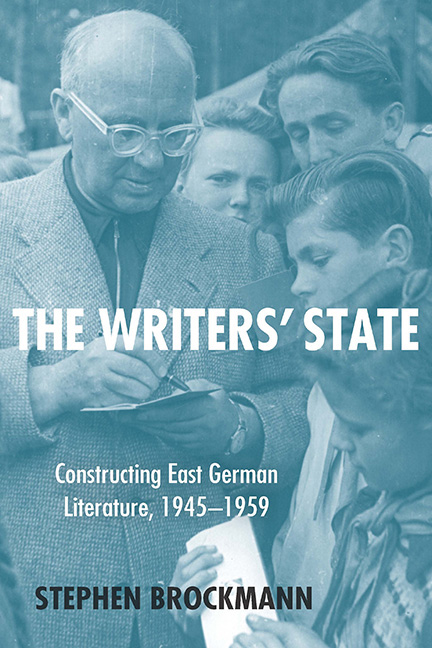Conclusion
Published online by Cambridge University Press: 05 February 2016
Summary
THIS BOOK ENDS MORE OR LESS where a standard history of East German literature might begin: with the year 1959, when German writers met in the industrial city of Bitterfeld to embark on the so-called “Bitterfelder Weg.” The Bitterfelder Weg would bring writers into factories and encourage factory workers to write (“Greif zur Feder, Kumpel!”—“Reach for your pen, brother!”). The idea behind the Bitterfelder Weg was to portray the actual lived reality of social and economic life in the German Democratic Republic, a task that many young authors, including Franz Fühmann, Christa Wolf, and Brigitte Reimann embraced with enthusiasm. In particular Wolf's Der geteilte Himmel (Divided Heaven, 1963) and Reimann's Ankunft im Alltag (Arrival in the Everyday, 1961) seemed to herald the appearance of a new generation of writers and a new approach to literature itself.
As I hope to have shown in the previous chapters, however, the supposedly new path embarked upon by East German literature in 1959 was in fact an old one. The SED had been urging writers to take this path for at least a decade before the first conference in Bitterfeld. After all, there had been a major debate about contemporary literature and the need for portrayals of the East German present as early as 1949, in the wake of the publication of Otto Gotsche's Tiefe Furchen. As Gustav Leuteritz had complained on that occasion, “Viewed objectively, [we] have not paid our debt of new creation to the German present” and “We are marching in place, we are not marching forward.” In subsequent years, party leaders repeatedly complained about East German literature's supposed failure to keep up with the times. In the so-called Nachterstedter Brief (Nachter stedt Letter) of January 1955, a group of workers at a brown coal factory northwest of Halle had, with prodding from the SED, addressed a letter to East German writers urging: “We would like more books about the magnificent construction taking place in all areas of our German Democratic Republic, about the labor and life of working people.” At the 1956 congress of the East German Writers Union, Walter Ulbricht once again urged writers: “Sing about the people who are working for a luminous future.” He also charged writers with failing to keep up with the pace of social change in the GDR.
- Type
- Chapter
- Information
- The Writers' StateConstructing East German Literature, 1945-1959, pp. 335 - 344Publisher: Boydell & BrewerPrint publication year: 2015



